Film review: "Death of a President"
 international |
arts and media |
feature
international |
arts and media |
feature
 Monday October 23, 2006 00:08
Monday October 23, 2006 00:08 by cling film buff
by cling film buff

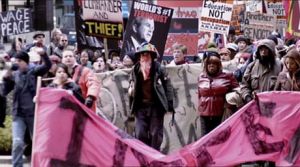
Protestors against Bush in 2007
"Death of a President" was the opening film at the 2006 Toronto Film Festival, and caused something of a minor political uproar for its depiction of the assassination of George W Bush in Chicago in 2007. The Republican Party in Texas asked for it not to be screened, while Hilary Clinton (more than likely Bush's successor) called it "despicable", "absolutely outrageous", and called the fictionalised shooting incident as "a horrible scenario". Two large cinema chains in the US stated they would not screen the film - although it has secured a distributor now. It was also shown as the opening picture in the Cork Film Festival; and was screened twice on UK television in the last month, first on digital station More4 and then the terrestrial Channel 4.
I dont think I've ever seen a feature film focus on an assassination of a real life person who is still alive - especially if its a politician. We've seen political shootings in films set in the present day such as Jonathan Demme's "Manchurian Candidate", and Tim Robbins "Bob Roberts"; but in these the Republican Party is never named, and the figures are all fictionalised, if thinly disguised charicatures of real life personas. Likewise feature films set in the not too distant future often contain nightmarish dystopian visions, examples being the recent "Children of Men" or "V for Vendetta"; yet these scenarios are controlled by fascist thugs and authoritarian big brothers, and never mentioned any one existing political party or political leader in Britain.
WARNING: This review contains some plot spoilers
In recent years there's been a welcome resurgence of interest in the political documentary, following Michael Moore's polemic against George Bush a couple of years ago in "Fahrenheit 9/11". And although Moore raised the ire of many right wing commentators in his own country, his message ultimately went unheeded and Bush romped home, without a shadow of the messing witnessed in 2000. Its rare that a political feature will cause much controversy, particularly when its to the left of centre. "Medium Cool" and its modern day tribute "This Revolution", both shot in the thick of the action, found favour with intellectuals and film buffs but never set the streets on fire or raised the voices of those on the right. The film thats probably caused the most uproar in recent years is "La Haine", which the French cabinet was brought to, and may or may not have contributed to sporadic unrest in Paris when it was released - of course it was almost prophetic in a way when France erupted late last year with enormous rioting in urban centres.
But is "Death of a President" any good? Constructed in a faux documentary style, it begins with a woman in a hijab speaking in arabic (I think), obviously emotionally distraught, talking to the invisible interviewer, asking if the person who pulled the trigger thought about the consequences of their actions in advance.. but then that storyline is left for later. Bush is arriving into hostile territory for a conference. Actors playing the parts of secret service agents, journalists and speech writers all give their side of the events leading up to the shooting. All seem credible, and there is little to differentiate it at this stage from a genuine political documentary.
And because Bush is there, with the stock footage weaved together into a coherent narrative, its very easy to suspend your knowledge that its not real and get into the story. The motorcade is greeted with jeers by anti-war protestors, who break through the police cordon to manage to touch the president's car - "a major security breach" as its described. This in turn leads to an escalation in the stand off later on in the evening, ending with the usual pepper spray, batons, screaming, arrests etc that you'd come to expect from any large scale action with lots of "militants". However during the scuffles one anarchist breaks through the police line unhindered with a long narrow bag on his back, and manages to access a building across the way from the conference centre...
Meanwhile Bush is finishing up his speech, and doing a bit of meeting & greeting with the party faithful at the rear entrance of the conference centre. His guards are edgy, but once an "environmental nut" has been dealt with, they breathe a brief sigh of relief... until suddenly shots violently ring out, and Bush along with one of his minders take a bullet. All hell breaks loose, there's absolute chaos, people are shrieking in terror, the agents are all shouting at once. Bush is bundled into the presidential car, which takes off at speed towards a hospital. We see his doctors later on giving a press conference, saying he has a strong heart and should be ok... but of course we know otherwise. The investigation by the FBI begins almost immediately; the CCTV tapes from the locality are rounded up and scrutinised, and a list of suspects soon emerges. Admittedly the suspects do fit the stereotype of the discontented - a gulf war vet, an anarchist, a Syrian with a possible link to Al-Qaeda.
In the end however, it doesnt really matter who the suspect is, or what their motives are. It is the response that is predictable - and ultimately the most chilling and credible. President Cheney is inaugurated after giving the eulogy at Bush's funeral. And so begins a new stage in the war on terror, with a new Patriot Act with broader definitions of 'terrorism', higher levels of security, greater powers of surveillance given to the agencies, and a potential conflict in the Middle East based on extremely tenuous links to the would-be assassin. The story pulls in more characters, mostly the families of the accused, and we see the effects of the Bush administration's political choices manifesting themselves in the both the anguish of the Syrian's wife, and the pain of the mother of the dead US soldier.
The film slows down somewhat in the second half, the energy of the street protests and chaos of the assassination would have been impossible to maintain all the way through. Yet it is the latter stages of the film which show a scenario which is utterly plausible, and in essence not much different from the current situation in the US. The killing of Bush only increases the eroding of civil liberties and results in a military build up - in much the same way that the Americans responded to the Sept 11 attacks. If anything it shows that violence begets violence. Shooting Bush is not a method of resolving conflict; like a hydra the GOP head grows back twice as strong and determined to inflict as much damage and revenge as possible. The story concludes with the grim result of an innocent man locked away in prison, but in the new atmosphere of fear and tension, his background means it will be a long time before he gets out - and nobody is particularly bothered about his plight.
Although a lot of hype has surrounded this film, which is usually a good way of spoiling it in advance because you expect too much, it is definitely worth a viewing.
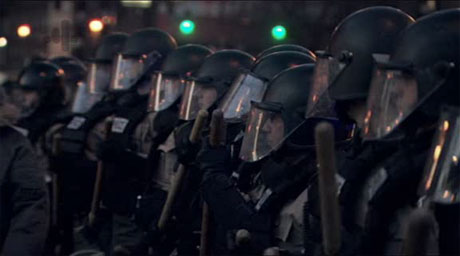
things get a little heated outside where Bush is speaking
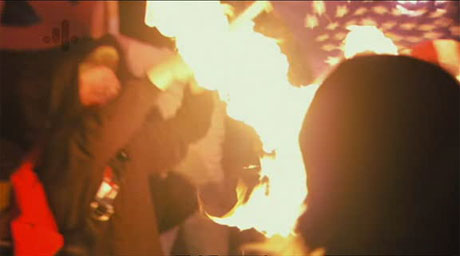
ceremonial flag burning
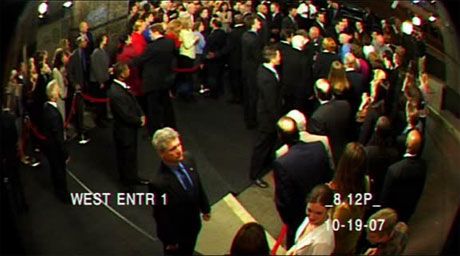
CCTV camera shot from hotel lobby where Bush gets shot
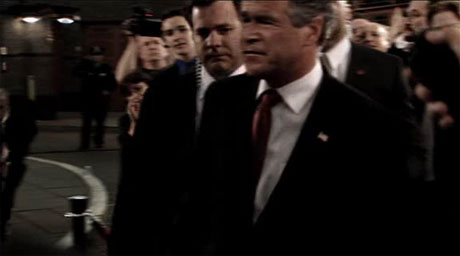
about half a second before Bush is shot
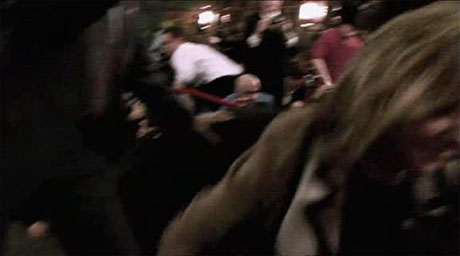
chaos in the shooting aftermath
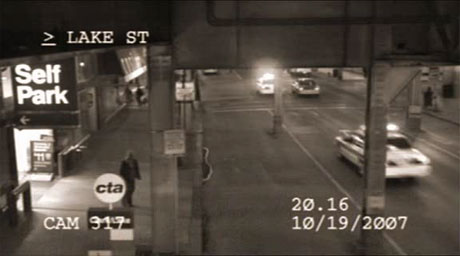
one suspect on CCTV
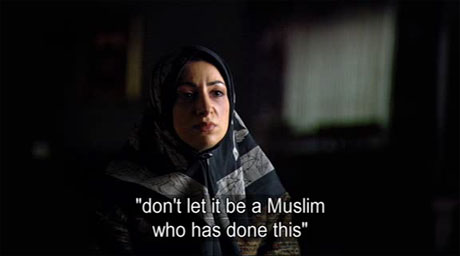
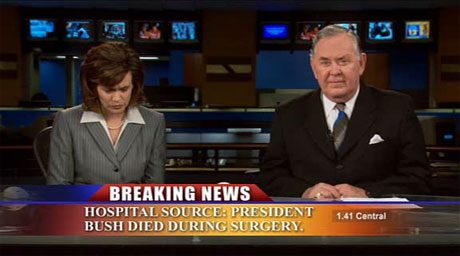
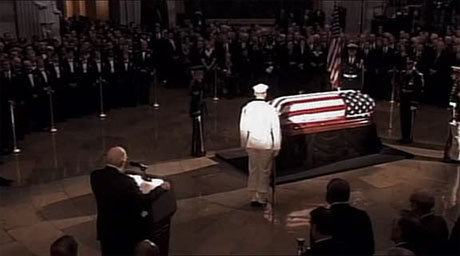
Cheney gives the eulogy at Bush's funeral
 international |
arts and media |
feature
international |
arts and media |
feature
 Monday October 23, 2006 00:08
Monday October 23, 2006 00:08 by cling film buff
by cling film buff


































 printable version
printable version

 Digg this
Digg this del.icio.us
del.icio.us Furl
Furl Reddit
Reddit Technorati
Technorati Facebook
Facebook Gab
Gab Twitter
Twitter
View Full Comment Text
save preference
Comments (19 of 19)